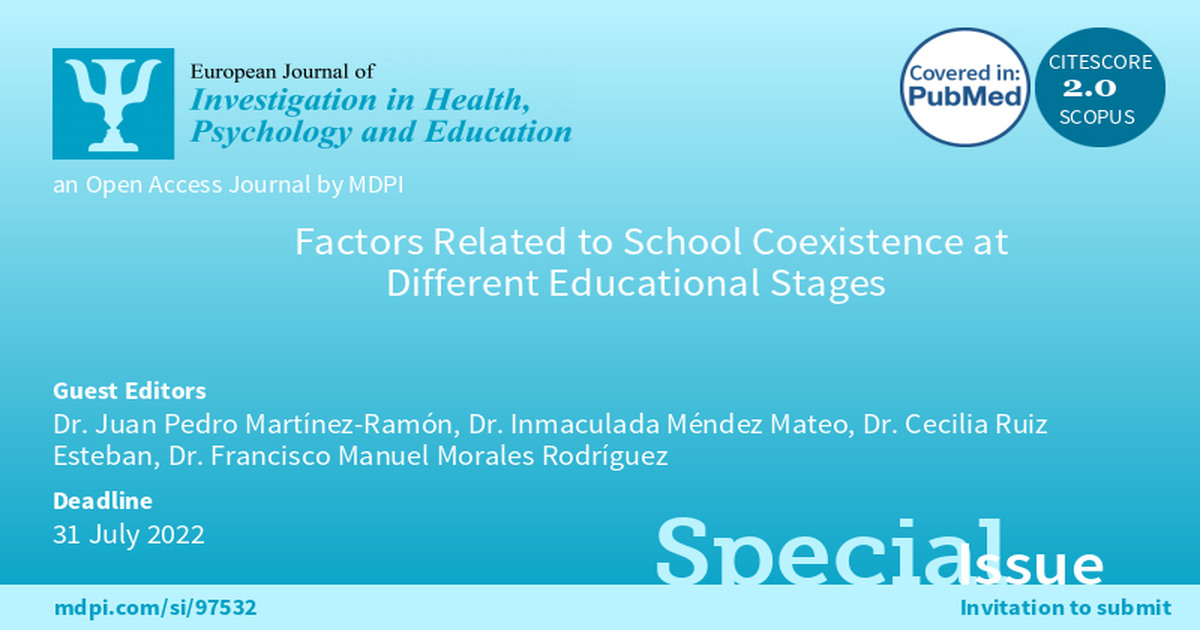- 2.6Impact Factor
- 5.1CiteScore
- 30 daysTime to First Decision
Factors Related to School Coexistence at Different Educational Stages
Special Issue Information
Dear Colleagues,
School coexistence is a transversal element that influences the performance of the educational center, the policies that are implemented, the stress levels of teachers, the academic results of students, the rate of bullying and cyberbullying, and many other aspects. The agents involved in the proper functioning of an educational center and the development of a pleasant climate of coexistence are families, teachers, and students, although ultimately the whole of society participates directly or indirectly in it. Relationships, interactions, and synergies are established between the different educational agents that must be studied and in which both internal and external variables intervene. The study of school coexistence covers all educational stages, from the beginning of schooling in nursery schools to the university, passing through the primary and secondary education stages. These last two stages have been studied more than the university. In order to obtain a clear picture of the current situation of school coexistence and to develop effective strategies to intervene in the problems affecting the school climate, it is necessary to take a global approach and analyze the phenomenon at various educational stages. The information gathered from the different studies will help to design prevention and intervention programs that are much more in line with the reality of teaching.
Dr. Juan Pedro Martínez Ramón
Dr. Inmaculada Méndez Mateo
Dr. Cecilia Ruiz Esteban
Dr. Francisco Manuel Morales Rodríguez
Guest Editors
Manuscript Submission Information
Manuscripts should be submitted online at www.mdpi.com by registering and logging in to this website. Once you are registered, click here to go to the submission form. Manuscripts can be submitted until the deadline. All submissions that pass pre-check are peer-reviewed. Accepted papers will be published continuously in the journal (as soon as accepted) and will be listed together on the special issue website. Research articles, review articles as well as short communications are invited. For planned papers, a title and short abstract (about 250 words) can be sent to the Editorial Office for assessment.
Submitted manuscripts should not have been published previously, nor be under consideration for publication elsewhere (except conference proceedings papers). All manuscripts are thoroughly refereed through a single-blind peer-review process. A guide for authors and other relevant information for submission of manuscripts is available on the Instructions for Authors page. European Journal of Investigation in Health, Psychology and Education is an international peer-reviewed open access monthly journal published by MDPI.
Please visit the Instructions for Authors page before submitting a manuscript. The Article Processing Charge (APC) for publication in this open access journal is 1600 CHF (Swiss Francs). Submitted papers should be well formatted and use good English. Authors may use MDPI's English editing service prior to publication or during author revisions.
Keywords
- coexistence
- attention to diversity
- coping strategies
- stress
- bullying
- cyberbullying
- self-esteem
- student
- teachers
- family
- early childhood education
- primary education
- secondary education
- tertiary education
- university
- prevention

Benefits of Publishing in a Special Issue
- Ease of navigation: Grouping papers by topic helps scholars navigate broad scope journals more efficiently.
- Greater discoverability: Special Issues support the reach and impact of scientific research. Articles in Special Issues are more discoverable and cited more frequently.
- Expansion of research network: Special Issues facilitate connections among authors, fostering scientific collaborations.
- External promotion: Articles in Special Issues are often promoted through the journal's social media, increasing their visibility.
- e-Book format: Special Issues with more than 10 articles can be published as dedicated e-books, ensuring wide and rapid dissemination.

